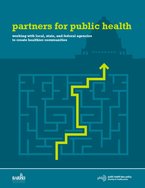Found 21 resources.
0
0
0
Homelessness and child welfare system involvement pose substantial challenges for families, but supportive housing can help them stay together and access secure housing.
Topics: Advocacy, Dual-generation, Healthy homes, Homelessness, Housing, Low-income, Stability
 Shared by Molli Caite Hughes
on Nov 15, 2023
Shared by Molli Caite Hughes
on Nov 15, 2023 0
0
0
People experiencing homelessness disproportionately face systemic barriers to employment, which make finding and keeping a job neither simple nor easy.
Topics: Advocacy, Homelessness, Low-income, Stability, Workforce development
 Shared by Molli Caite Hughes
on Nov 15, 2023
Shared by Molli Caite Hughes
on Nov 15, 2023 0
0
0
The Trump Administration is publicly weighing plans to gradually lower the official poverty line by applying a smaller cost-of-living adjustment each year. Doing so would be unjustified for several reasons.
Topics: Child welfare, Food insecurity, Legislation & Policy, Low-income, Nutrition, Stability
 Shared by Housing Is
on Jun 11, 2019
Shared by Housing Is
on Jun 11, 2019 0
0
0

Navigating college as a first-generation college student can feel like making your way through a maze with no map, filled with “learn as you go” lessons, and “wow, I wish I knew this then.” When you combine it with being low-income, homeless, and/or food insecure, it can feel like you’re navigating the same maze blindfolded, on a tightrope, balancing multiple responsibilities. It should not be like this.
Topics: Low-income, Post-secondary, Stability, Youth
 Shared by Housing Is
on May 29, 2019
Shared by Housing Is
on May 29, 2019 0
0
0

Founded in 1995 as Project Women, Family Scholar House (FSH) provides comprehensive, holistic services for disadvantaged single parents, their children, and foster alumni. The nonprofit seeks to end the cycle of poverty and transform communities by empowering families and youth to succeed in education and life-long self-sufficiency. FSH provides supportive housing, educational programming, and participant advocacy to help families gain independence.
Topics: Dual-generation, Early childhood, Education, Homelessness, Housing, Low-income, Partnerships, Place-based, Post-secondary, South, Stability
0
0
0
Over the past two decades, criminal justice reform has focused on evidence-based interventions to prevent arrests and incarceration and to facilitate community reintegration. These initiatives represent a movement toward a less punitive, more holistic approach to public safety, targeting critical social factors that lead to and perpetuate criminal justice involvement. Because housing problems are often a key underlying factor for people’s involvement with the criminal justice system, there are ways housing interventions can help lessen criminal justice involvement. Decriminalizing...
Topics: Criminal justice, Homelessness, Housing, Legislation & Policy, Low-income, Research, Stability
0
0
0

For many years, the vulnerabilities of children experiencing homelessness have been glossed over on the assumption that their innate resilience would overcome the impact of homelessness. As someone who worked in the field, I would often hear, “Oh, they’ll never remember.” Today we know better. We know more about how the brain develops and about how trauma impacts brain development. There is a growing recognition among providers that these early years are critical for establishing a foundation for emotional, mental, and physical wellbeing, and that we don’t get a second chance at early...
Topics: Early childhood, Education, Homelessness, Housing, Low-income, Research, Safety, Stability
 Shared by Housing Is
on Feb 21, 2019
Shared by Housing Is
on Feb 21, 2019 0
0
0
Quality affordable housing can be a “vaccine” which prevents long-term health problems and promotes healthy, productive lives. When a family’s housing situation is unaffordable and unstable, chances to lead a healthy life dwindle rapidly.
Topics: Child welfare, Health, Homelessness, Housing, Low-income, Partnerships, Seniors, Stability
0
0
0

Women with children, especially, stay hidden in fear of losing custody of their children. As a result, we will never see them camping in tents or in downtown parks.
Topics: Early childhood, Homelessness, Housing, Legislation & Policy, Low-income, Safety, Stability
0
0
0
State and local governments are debating and adopting new landlord-tenant laws and pilot programs, such as expanded legal representation and just-cause eviction requirements. Yet, few housing experts understand evictions well enough to channel the demand for change into clarity about specific eviction problems and potential solutions. Now is the time for policymakers and advocates to get smart. Here are five strategies for policymakers to consider as they address America’s eviction crisis.
Topics: Housing, Legislation & Policy, Low-income, Research, Stability
0
0
0
New York City’s UAC has generated substantial interest as other jurisdictions across the U.S. consider or implement similar programs. In June 2018, San Francisco voters approved a ballot initiative requiring the city to establish, fund, and run a program to provide legal representation to all tenants facing eviction regardless of income. The Los Angeles City Council approved a motion in August 2018 instructing the housing department to develop recommendations for a new eviction defense bill or program.
Topics: Housing, Legislation & Policy, Low-income, Stability
0
0
0
In response to the heightened interest in the relationship between work and the health of individuals and communities, CMCS has clarified that Medicaid funds cannot be used to pay beneficiaries’ wages, but can pay for employment counseling as an optional benefit—to help people get jobs. Years of experience with work requirements for the Supplemental Nutrition Assistance Program, Aid to Families with Dependent Children, and populations with disabilities have developed the evidence for what is needed to help different populations find and keep jobs.
Topics: Affordable Care Act, Disabilities, Health, Legislation & Policy, Low-income, Medicaid / Medicare, Research, Stability, Workforce development
0
0
0
Stricter work requirement policies for the Supplemental Nutrition Assistance Program (SNAP) at the federal level were left out of the recently passed farm bill, but state policymakers are still considering whether to expand or establish their own work requirements for SNAP and Medicaid, with the goal of incentivizing employment. There’s no question that good jobs help spur upward mobility. But if we are serious about helping people work, we have to get serious about helping people improve their skills.
Topics: Child welfare, Cost effectiveness, Dual-generation, Early childhood, Food insecurity, Legislation & Policy, Low-income, Research, Stability, Workforce development
0
0
0
Health and reentry are closely related, and chronic medical, mental health, and substance use problems make it harder for newly released people to seek employment, obtain housing, and avoid reincarceration. Compared with the general population, justice-involved people tend to be in poorer health and need access to physical and behavioral health services, as well as the know-how and motivation to get care.
Topics: Affordable Care Act, Criminal justice, Health, Legislation & Policy, Low-income, Medicaid / Medicare, Research, Stability
0
0
0
With collectively more than 100 years of policy expertise and values-based leadership between us, Ascend at the Aspen Institute and the Housing Opportunity and Services Together initiative at the Urban Institute partnered to develop a set of recommendations on how to harness assisted housing and public-private housing partnerships for better outcomes for families.
Topics: Dual-generation, Early childhood, Education, Family engagement, Health, Housing, Low-income, Place-based, Research, Stability
0
0
0
Housing instability among families and children can be detrimental to child welfare, health, economic, and other outcomes. Policymakers and service providers in these fields should consider weaving housing into their approaches. Treating instability at its roots can relieve the trade-offs and stress that emerge when no decent housing is affordable. Evidence indicates that affordable housing can improve a range of outcomes for families and—in combination with short-term or long-term services—help providers tackle complex challenges head-on.
Topics: Child welfare, Family engagement, Housing, Low-income, Stability, Supportive housing
0
0
0

People with mental health disabilities are vastly overrepresented in the population of people who experience homelessness. Of the more than 550,000 people in America who experienced homelessness on a given night in 2017, 1 in 5 had a mental illness. The proportion of people experiencing chronic homelessness with mental health disabilities was even higher—nearly 1 in 3. Despite this fact, the reality is that most people with mental illness fortunately do not experience homelessness: While about 20 percent of all adults in the United States have a mental illness, less than two-tenths of 1...
Topics: Depression, Disabilities, Homelessness, Housing, Legislation & Policy, Low-income, Mental health, Partnerships, Preventative care, Stability, Substance abuse, Supportive housing
0
0
0
On January 1, 2014, in states that have chosen to expand Medicaid eligibility under the Affordable Care Act, nearly all chronically homeless people who lacked health insurance became eligible for Medicaid. This Primer offers state Medicaid officials and other interested parties strategies for using Medicaid to meet the needs of this very vulnerable population--some strategies that have succeeded in the past and some that are emerging under provisions of the Affordable Care Act.
Topics: Affordable Care Act, Criminal justice, Disabilities, Dual-eligibles, Funding, Health, Homelessness, Housing, Low-income, Medicaid / Medicare, Mental health, Partnerships, Stability, Substance abuse, Supportive housing
 Shared by Housing Is
on Jul 27, 2018
Shared by Housing Is
on Jul 27, 2018 0
0
0
SAHF members believe that connecting residents of affordable housing with needed supports – such as educational resources or health services – can help vulnerable families and seniors achieve
a better quality of life. SAHF began the Outcomes Initiative to create a common framework for its members to demonstrate with data the impact on residents of providing housing-based services and support in the five key areas listed below.
Topics: Asset building, Cost effectiveness, Dual-generation, Education, Exercise, Food insecurity, Health, Housing, Mental health, Metrics, Nutrition, Safety, Stability
 Shared by Housing Is
on Jul 26, 2018
Shared by Housing Is
on Jul 26, 2018 0
0
0
This guide is intended to provide information to public health department staff and advocates about the many public agencies that make policy decisions and implement projects related to the physical environment.
Topics: Child welfare, Community development, Education, Exercise, Green, Health, Housing, Legislation & Policy, Place-based, Safety, Smoke-free, Stability, Substance abuse, West Coast
 Shared by Housing Is
on Jul 13, 2018
Shared by Housing Is
on Jul 13, 2018 0
0
0
Working Together to Meet Unmet Housing and Healthcare Needs
Topics: Affordable Care Act, Data sharing, Health, Homelessness, Housing, Low-income, Medicaid / Medicare, Mental health, Partnerships, Stability, Substance abuse, Supportive housing
 Shared by Housing Is
on Jul 10, 2018
Shared by Housing Is
on Jul 10, 2018 


